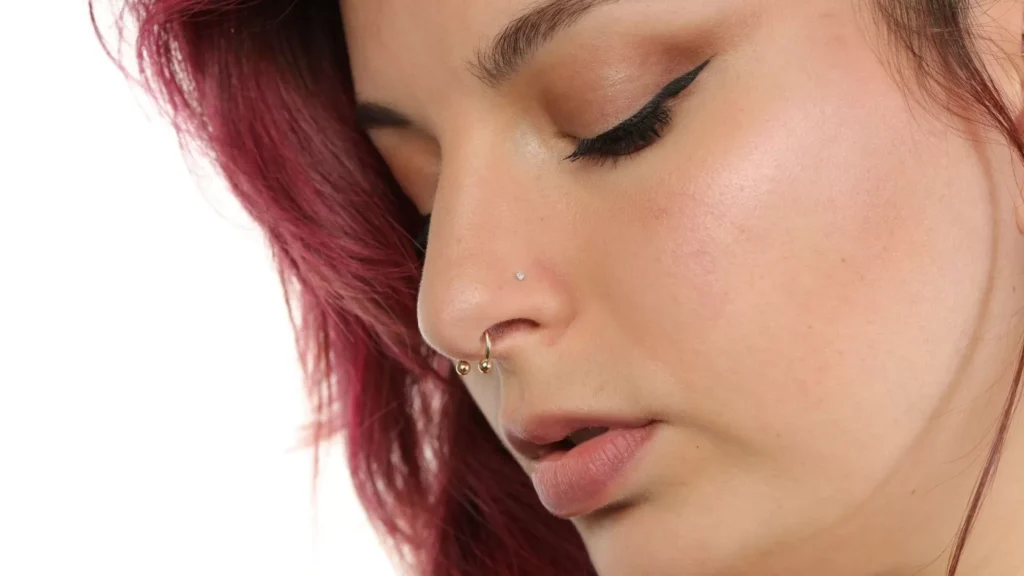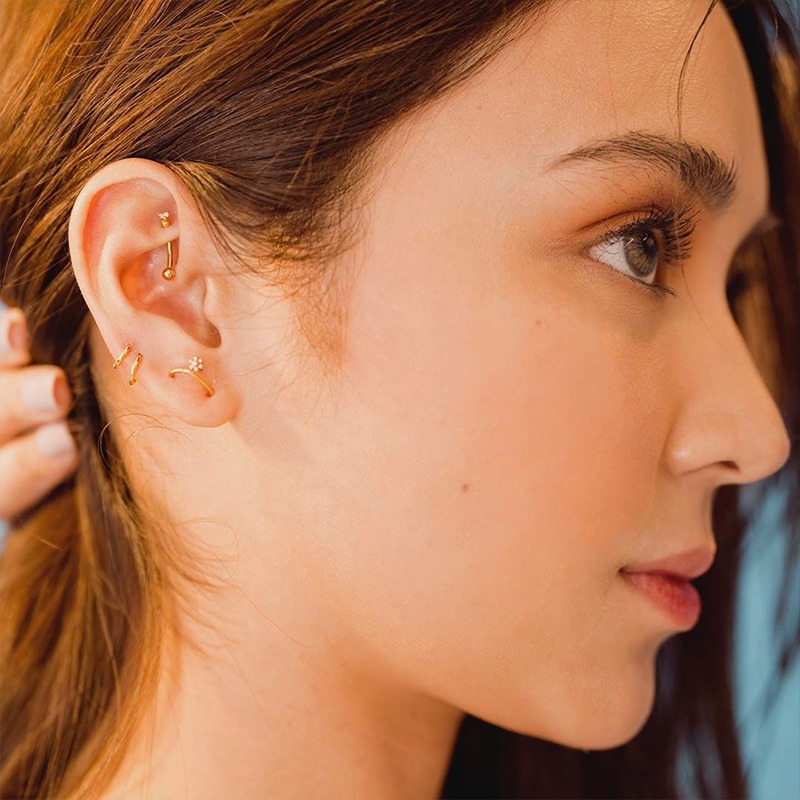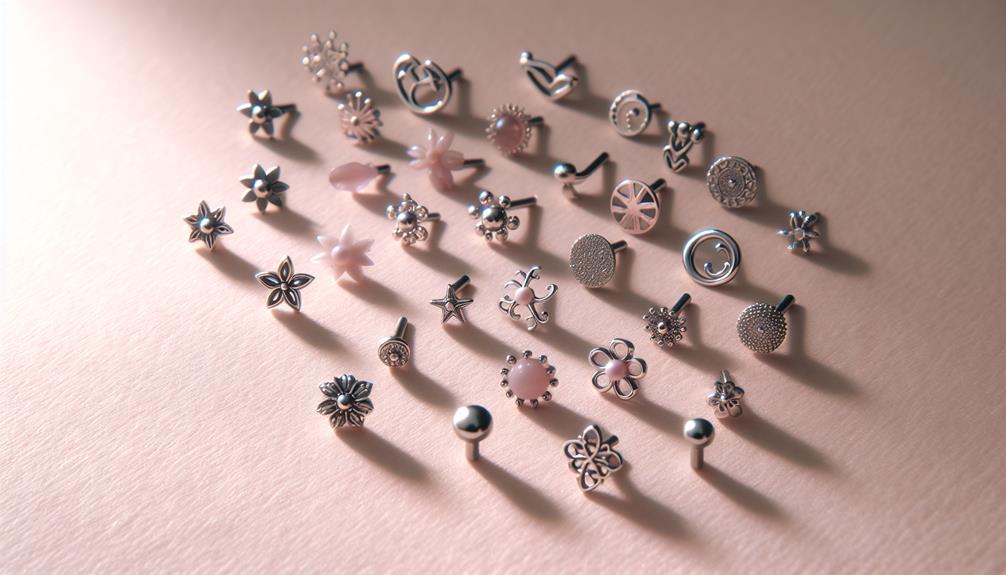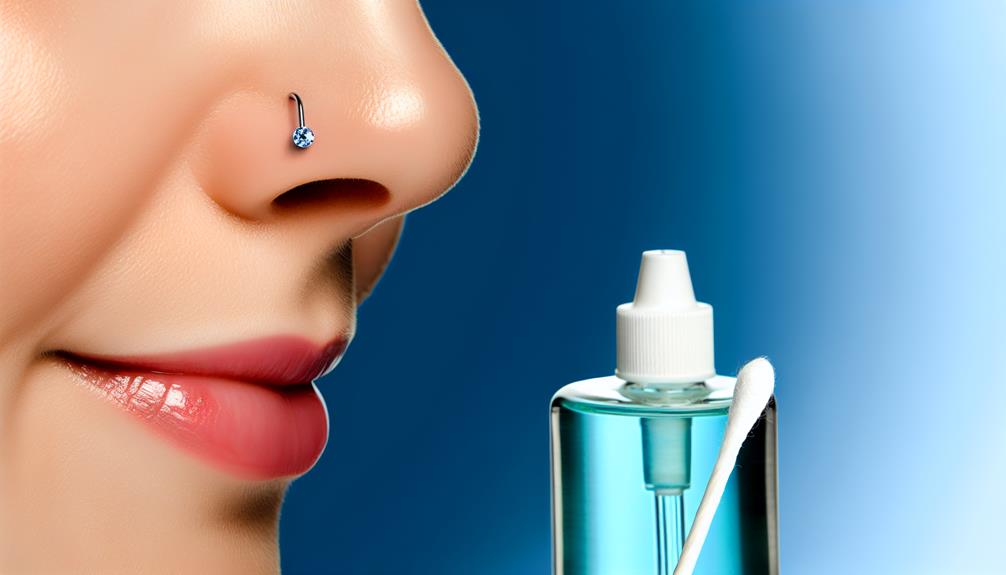Understanding the cause of nose piercing smell
A nose piercing is a popular form of body modification, but it can sometimes come with an unpleasant side effect – a smell. The odor can be described as musty or metallic, and it is often a result of bacteria buildup in the pierced area. When a nose piercing is healing, it is common for crusts to form around the jewelry, and these crusts can trap bacteria. The moisture and warmth of the area create an ideal environment for bacterial growth, leading to an unpleasant smell. It is important to properly clean and care for a nose piercing to prevent this odor.
Common misconceptions about nose piercing odor
There are several common misconceptions about the cause of nose piercing odor. It is not necessarily a sign of infection, as some may believe. In fact, a healthy healing piercing can still have a smell due to the presence of bacteria. Similarly, the smell is not an indication that the jewelry is low quality. Even with high-quality jewelry, bacterial buildup can occur if the piercing is not properly cleaned and cared for.
It is also important to note that the smell may not be noticeable to everyone. Some individuals may be more sensitive to it, while others may not experience any odor at all. Additionally, certain factors can worsen the smell, such as wearing tight-fitting jewelry that restricts airflow or using harsh cleaning solutions.
So, nose piercing smell is a common issue that can occur during the healing process. It is caused by bacterial buildup in the pierced area and can often be prevented through proper cleaning and care. While the smell may be unpleasant for some individuals, it does not necessarily indicate infection or low-quality jewelry. By understanding the cause of nose piercing odor and dispelling common misconceptions, individuals can properly care for their piercings and minimize any associated smells.
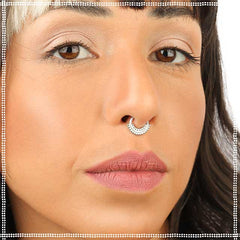
Proper Cleaning Routine
Establishing a regular cleaning routine
To prevent an unpleasant smell and promote healing, it is crucial to establish a regular cleaning routine for a nose piercing. Cleaning the piercing twice a day can help remove bacteria and prevent buildup. Here are some steps to follow:
- Wash your hands thoroughly with soap and water before touching your piercing.
- Soak a clean cotton ball or pad in a saline solution or warm saltwater. Saline solution can be purchased at a piercing studio or made at home by mixing 1/4 teaspoon of non-iodized sea salt with 8 ounces of warm distilled water.
- Gently clean around the piercing site, being careful not to rotate or move the jewelry. Remove any crusts or debris that may have formed.
- Rinse the piercing with clean water to remove any remaining saline solution or saltwater.
- Pat the area dry with a clean, disposable paper towel. Avoid using regular towels or cloth as they may harbor bacteria.
Recommended cleaning solutions for nose piercing
There are a few different cleaning solutions that are recommended for nose piercings. These solutions help to effectively clean the piercing without causing irritation or drying out the skin. Here are some options to consider:
- Saline solution: Saline solution is a gentle and effective option for cleaning a nose piercing. It helps to flush out bacteria and promote healing. Look for a sterile saline solution that is specifically formulated for piercings.
- Sea salt soak: A sea salt soak can be made at home by mixing 1/4 teaspoon of non-iodized sea salt with 8 ounces of warm distilled water. Soak a cotton ball or clean cloth in the saltwater solution and hold it gently against the piercing for a few minutes.
- Piercing aftercare spray: There are specially formulated piercing aftercare sprays available that can be used to clean a nose piercing. These sprays often contain ingredients like sea salt and chamomile extract to soothe and cleanse the piercing.
Remember to always follow the instructions provided by a professional piercer or consult with a healthcare professional if you have any concerns or questions about the appropriate cleaning routine for your nose piercing. A clean and well-cared-for piercing is more likely to heal properly and minimize any associated smells.

Choosing the Right Jewelry
Selecting high-quality jewelry materials
When it comes to choosing jewelry for your nose piercing, it is important to opt for high-quality materials that are safe for your piercing and won’t cause any irritation or odor. Here are some options to consider:
- Titanium: Titanium is a popular choice for nose piercings as it is hypoallergenic and less likely to cause any allergic reactions or skin sensitivities. Look for implant-grade titanium jewelry for the best quality.
- Surgical stainless steel: Surgical stainless steel is another safe and affordable option for nose piercing jewelry. Make sure to choose jewelry that is specifically labeled as surgical stainless steel to ensure it meets the appropriate standards.
- Gold: If you prefer a more luxurious option, gold jewelry can also be used for nose piercings. However, it is important to choose 14k or 18k gold to minimize the risk of allergic reactions or tarnishing.
Avoiding jewelry that contributes to odor
Certain types of jewelry materials and designs can contribute to unpleasant odors around your nose piercing. It is best to avoid the following options:
- Low-quality metals: Jewelry made from low-quality metals, such as nickel or plated metals, can cause irritation and emit a foul smell. It is important to invest in high-quality materials to minimize any odor.
- Captive bead rings: Captive bead rings, also known as CBRs, can trap bacteria and contribute to odor. It is best to avoid this type of jewelry and opt for flat-back studs or labret-style jewelry instead.
- Improperly sized jewelry: Wearing jewelry that is too tight or too loose can increase the risk of bacterial growth and odor. It is important to choose jewelry that fits correctly and consult with a professional piercer for proper sizing.
Remember to always consult with a professional piercer when selecting jewelry for your nose piercing. They can provide guidance and ensure you choose the right materials and designs that are suitable for your piercing and lifestyle. By choosing high-quality jewelry and avoiding materials that contribute to odor, you can maintain a clean and pleasant-smelling nose piercing.

Avoiding Irritation
Preventing irritation around the piercing area
When choosing jewelry for your nose piercing, it is crucial to prevent any irritation around the piercing area. Here are some tips to avoid irritation:
- Cleanse regularly: Make sure to clean your nose piercing regularly using a saline solution or a gentle cleanser recommended by your piercer. This will help remove any build-up of bacteria or dirt that can cause irritation.
- Avoid harsh chemicals: Keep away from harsh chemicals such as perfumes, makeup, or cleaning products, as they can irritate the piercing and hinder the healing process. Stick to gentle, non-irritating products on and around the piercing area.
- Avoid touching: Resist the urge to touch or play with your nose piercing, as this can introduce bacteria and irritate the healing tissue. Always clean your hands before handling your jewelry or touching the piercing area.
- Avoid tight clothing: Be mindful of the clothing you choose, especially around the nose area. Wearing tight clothing, such as turtlenecks or scarves, can rub against the piercing and cause irritation. Opt for loose-fitting clothing to allow the piercing to heal properly.
Choosing appropriate jewelry sizes and styles
Selecting the right sizes and styles of jewelry for your nose piercing is essential to prevent irritation. Here are some guidelines to follow:
- Proper sizing: It is crucial to choose jewelry that fits well without being too tight or too loose. Consult with your piercer to determine the appropriate size for your nose piercing and avoid any discomfort or irritation caused by ill-fitting jewelry.
- Flat-back studs: Consider using flat-back studs or labret-style jewelry for your nose piercing, as they have a flat back that sits comfortably against the skin, reducing irritation and minimizing the risk of snagging or catching on clothing.
- Avoid excessive dangling or weight: Avoid wearing heavy or excessively dangling jewelry in the early stages of healing to prevent unnecessary irritation and strain on the piercing.
- Choose hypoallergenic materials: Opt for jewelry made from hypoallergenic materials such as titanium or surgical stainless steel, which are less likely to cause allergic reactions or irritations.
Remember, if you experience any persistent or severe irritation around your nose piercing, it is best to consult with your piercer or a healthcare professional for proper guidance and care. Taking the necessary steps to prevent irritation and choosing appropriate jewelry will help ensure a healthy and comfortable healing process for your nose piercing.
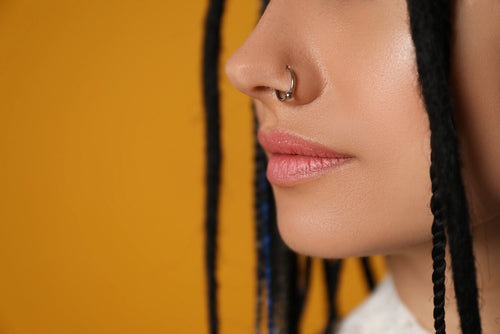
Proper Hygiene Practices
Maintaining good overall hygiene
When it comes to nose piercings, maintaining good overall hygiene is essential for preventing any irritation. Here are some tips to keep in mind:
- Wash your hands: Before touching your nose piercing or cleaning the area, always make sure to wash your hands thoroughly with soap and water. This helps prevent the transfer of bacteria to the piercing.
- Shower regularly: It is important to keep your body clean to avoid any potential infections around the piercing area. Make sure to shower regularly, especially if you engage in activities that cause you to sweat.
- Avoid sharing items: To prevent the spread of bacteria, avoid sharing items such as towels, pillowcases, or makeup brushes with others. This reduces the risk of introducing irritants to your healing piercing.
Keeping the pierced area clean
To avoid irritation and promote proper healing, it is crucial to keep the pierced area clean. Follow these guidelines:
- Cleanse with saline solution: Use a saline solution recommended by your piercer or prepare one at home by mixing 1/4 teaspoon of non-iodized sea salt with 8 ounces of distilled water. Gently cleanse the piercing area twice a day using a cotton swab or clean cloth.
- Avoid excessive touching or rotating: While cleaning the piercing, avoid excessive touching or rotating the jewelry as this can introduce bacteria and hinder the healing process. Only touch the area with clean hands when necessary.
- Avoid harsh cleaning products: Stick to gentle, non-irritating products specifically recommended for cleaning piercings. Avoid using alcohol, hydrogen peroxide, or anything abrasive that can cause additional irritation.
By following proper hygiene practices and taking care of your nose piercing, you can minimize the risk of irritation and ensure a healthy healing process. If you experience any persistent or severe discomfort, it is important to consult with your piercer or a healthcare professional for further guidance and care. Remember, each person’s healing process may vary, and it is essential to listen to your body and provide the necessary care for your individual needs.
Natural Remedies
Using natural remedies to combat odor
To combat odor in and around your nose piercing, there are several natural remedies you can try:
- Tea tree oil: Tea tree oil has natural antibacterial properties that can help eliminate odor-causing bacteria. Dilute a few drops of tea tree oil in distilled water and apply it to the piercing area using a cotton swab. Be sure to use a small amount, as tea tree oil can be strong and may cause irritation if not properly diluted.
- Saltwater solution: A saltwater solution can help cleanse the piercing and reduce odor. Mix 1/4 teaspoon of sea salt with 8 ounces of distilled water and stir until dissolved. Gently apply the solution to the piercing using a cotton swab or clean cloth. Rinse with water to remove any remaining residue.
Tea tree oil and sea salt solutions
| Tea Tree Oil | Saltwater Solution |
|---|---|
| • Natural antibacterial properties | • Helps cleanse the piercing |
| • Dilute a few drops in distilled water | • Mix 1/4 teaspoon of sea salt with 8 ounces of distilled water |
| • Apply with a cotton swab | • Gently apply to the piercing with a cotton swab or clean cloth |
| • Use sparingly to avoid irritation | • Rinse with water to remove residue |
By incorporating natural remedies into your nose piercing aftercare routine, you can effectively combat odor and promote a healthy healing process. However, it’s important to remember that everyone’s body is different, and what works for one person may not work for another. If you experience any persistent or severe odor or discomfort, it’s best to consult with your piercer or a healthcare professional for personalized advice and care.
Troubleshooting
Identifying potential issues with your nose piercing
If you are experiencing odor in and around your nose piercing, it could be a sign of an underlying issue. Here are some potential problems to watch out for:
- Infection: If the odor is accompanied by redness, swelling, pain, or discharge, it may indicate an infection. Infections can be caused by bacteria or other microorganisms entering the piercing site.
- Allergic reaction: Some people may have an allergic reaction to the metal used in their nose jewelry. This can lead to irritation, inflammation, and an unpleasant odor.
- Build-up of dead skin cells and debris: Poor hygiene or improper cleaning can result in the accumulation of dead skin cells and debris around the piercing, leading to odor.
Seeking professional advice when necessary
While natural remedies can often help alleviate odor and minor issues with your nose piercing, it is important to seek professional advice if the problem persists or worsens. A piercing professional or healthcare provider can provide guidance and treatment options tailored to your specific situation. They may recommend:
- Antibiotics: If you have an infection, antibiotics may be necessary to clear the infection and prevent further complications.
- Jewelry change: If you are experiencing an allergic reaction to your jewelry, your piercer may suggest changing to a different type of metal or material that is less likely to cause a reaction.
- Piercing removal: In rare cases, if the issue cannot be resolved or if there are severe complications, your piercer or healthcare provider may recommend removing the piercing altogether.
Remember, proper aftercare is essential for maintaining a healthy nose piercing. Keep the area clean and avoid touching it with dirty hands. If you have any questions or concerns about your nose piercing, don’t hesitate to reach out to a professional.
Lifestyle Adjustments
Avoiding certain activities that may exacerbate odor
If you are experiencing odor in and around your nose piercing, there are some lifestyle adjustments you can make to help alleviate the issue:
- Avoid swimming in pools, hot tubs, or bodies of water that may contain bacteria or other irritants that could worsen the odor.
- Avoid using products such as perfumes, lotions, or scented soaps near your piercing, as these may contribute to the unpleasant smell.
- Avoid touching or picking at your piercing with dirty hands, as this can introduce bacteria and contribute to infection and odor.
- Avoid wearing tight clothing or accessories that may rub against your nose piercing and cause irritation.
Tips for managing odor during physical activities
If you lead an active lifestyle, you may be more prone to experiencing odor with your nose piercing. Here are some tips to help manage the odor during physical activities:
- Cleanse your piercing before and after physical activities to reduce the build-up of sweat and bacteria.
- Avoid wearing heavy or dangling jewelry during high-intensity activities, as this may increase the chances of irritation and odor.
- Choose breathable materials for your jewelry, such as titanium or surgical-grade stainless steel, to reduce the risk of trapped sweat and odor.
- Consider using antimicrobial products specifically designed for piercings, such as saline sprays or piercing antiseptic solutions, to help maintain hygiene and minimize odor.
Remember, it is important to consult a professional if you are experiencing persistent or worsening issues with your nose piercing. They can provide expert advice and recommend appropriate solutions tailored to your situation. By making a few adjustments to your lifestyle and following proper aftercare practices, you can keep your nose piercing clean and odor-free.
Lifestyle Adjustments
Avoiding certain activities that may exacerbate odor
A person experiencing odor around their nose piercing can try some lifestyle adjustments to alleviate the issue:
- Avoid swimming in pools, hot tubs, or bodies of water that may contain bacteria or irritants that could worsen the odor.
- Avoid using products such as perfumes, lotions, or scented soaps near the piercing, as they may contribute to the unpleasant smell.
- Avoid touching or picking at the piercing with dirty hands, as this can introduce bacteria and lead to infection and odor.
- Avoid wearing tight clothing or accessories that may rub against the nose piercing and cause irritation.
Tips for managing odor during physical activities
Individuals with an active lifestyle may be more prone to experiencing odor with their nose piercing. Here are some tips to manage the odor during physical activities:
- Cleanse the piercing before and after physical activities to reduce the build-up of sweat and bacteria.
- Avoid wearing heavy or dangling jewelry during high-intensity activities, as this may increase the chances of irritation and odor.
- Choose breathable materials for jewelry, such as titanium or surgical-grade stainless steel, to reduce the risk of trapped sweat and odor.
- Consider using antimicrobial products specifically designed for piercings, such as saline sprays or piercing antiseptic solutions, to maintain hygiene and minimize odor.
It is important to consult a professional if experiencing persistent or worsening issues with a nose piercing. They can provide expert advice and recommend appropriate solutions tailored to the individual’s situation. By making these lifestyle adjustments and following proper aftercare practices, one can keep their nose piercing clean and odor-free.
Conclusion
Summary of tips to prevent nose piercing smell
- Avoid activities that may worsen the odor, such as swimming in pools or using scented products near the piercing.
- Keep the piercing area clean and avoid touching or picking at it with dirty hands.
- Select breathable materials for jewelry and ensure it is well-maintained.
- Consider using antimicrobial products specifically designed for piercings.
Resources:
For additional information and answers to commonly asked questions about nose piercings and odor management, refer to the following resources:
- WebMD: “Body Piercing: Aftercare, Complications, and Effect” – Available at: https://www.webmd.com/skin-problems-and-treatments/body-piercing-about
- Association of Professional Piercers – Available at: https://www.safepiercing.org/

